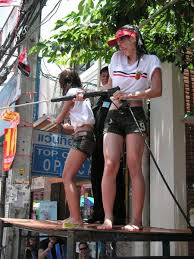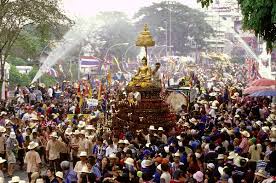Songkran
From Wikipedia, the free encyclopedia


A truck load of people after a "hit", Chiang Mai, Thailand
The date of the festival was originally set by astrological calculation, but it is now fixed. If these days fall on a weekend, the missed days off are taken on the weekdays immediately following. If they fall in the middle of the week, many Thai take off from the previous Friday until the following Monday. Songkran falls in the hottest time of the year in Thailand, at the end of the dry season. Until 1888 the Thai New Year was the beginning of the year in Thailand; thereafter 1 April was used until 1940. 1 January is now the beginning of the year. The traditional Thai New Year has been a national holiday since then.
New year traditions


Water throwing along the western moat of Chiang Mai, Thailand
Besides the throwing of water, people celebrating Songkran may also go to a wat (Buddhist monastery) to pray and give food to monks. They may also cleanse Buddha images from household shrines as well as Buddha images at monasteries by gently pouring water mixed with a Thai fragrance (Thai: น้ำอบไทย) over them. It is believed that doing this will bring good luck and prosperity for the New Year. In many cities, such as Chiang Mai, the Buddha images from all of the city's important monasteries are paraded through the streets so that people can toss water at them, ritually 'bathing' the images, as they pass by on ornately decorated floats. In northern Thailand, people may carry handfuls of sand to their neighborhood monastery in order to recompense the dirt that they have carried away on their feet during the rest of the year. The sand is then sculpted into stupa-shaped piles and decorated with colorful flags.
Some people make New Year resolutions - to refrain from bad behavior, or to do good things. Songkran is a time for cleaning and renewal. Besides washing household Buddha images, many Thais also take this opportunity to give their home a thorough cleaning.

People in a tuk tuk getting soaked during Songkran in Chiang Mai


Some children having fun at the Bangkok Zoo during Songkran.
Nowadays, the emphasis is on fun and water-throwing rather than on the festival's spiritual and religious aspects, which sometimes prompts complaints from traditionalists. In recent years there have been calls to moderate the festival to lessen the many alcohol-related road accidents as well as injuries attributed to extreme behavior such as water being thrown in the faces of traveling motorcyclists.
The water is meant as a symbol of washing all of the bad away and is sometimes filled with fragrant herbs.
Songkran is also celebrated in many places with a pageant in which young women demonstrate their beauty and unique talents, as judged by the audience. The level of financial support usually determines the winner, since, to show your support you must purchase necklaces which you place on your chosen girl.
Astrological calculation
Although the traditional calendar of Thailand like most of Southeast Asia utilizes a lunisolar calendar, the date of the new year was calculated on a purely solar basis. The term Songkran comes from Sanskrit "Sankranta" and means "a move or change" - in this case the move of the sun into the Aries zodiac. Originally this happened at the vernal equinox, but, as the Thai astrology did not observe precession, the date moved from March to April.There is a similar named Indian Festival called as Sankrant or Makar Sankranti celebrated on 14 January every year. Songkran as such has similarity to Indian festival of Holi.
The traditional new year celebration in Sri Lanka also coincides with the Thai new year.
Greetings
The traditional greeting is "สวัสดีปีใหม่" (sa-wat-dee pee mai), basically "Happy New Year". "Sawasdee" = also used for "hello" or "goodbye" (Romanized spellings may vary, i.e. "sawatdee", "sawadee" or "sawasdee"). "Pee" = year. "Mai" = new. Or "สุขสันต์ปีใหม่" (suk-san pee mai), "Suksan" = Happy.However, most people use "สุขสันต์วันสงกรานต์" (suk-san wan songkran) - meaning "Happy Songkran Day" - since "pi mai" is more often linked with the first of January. "Suksan" is also used as an attribute for other days such as "Valentine's Day" ("สุขสันต์วันแห่งความรัก", suk-san wan haeng khwam rak) = Happy Valentine's Day.


